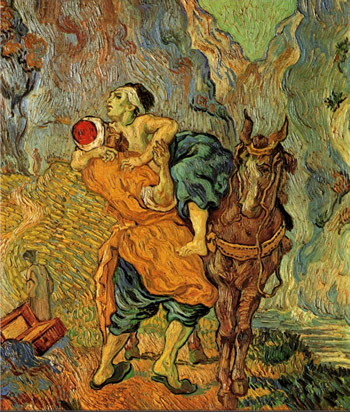Reflection on the International Day for the Elimination of Racial Discrimination
Patricia Burton-Williams, Executive Director, Women’s Inter-Church Council
On one occasion an expert in the law stood up to test Jesus. “Teacher,” he asked, “what must I do to inherit eternal life?” “What is written in the Law?” he replied. “How do you read it?” He answered, “‘Love the Lord your God with all your heart and with all your soul and with all your strength and with allyour mind’; and, ‘Love your neighbor as yourself.’”
“You have answered correctly,” Jesus replied. “Do this and you will live.”
But he wanted to justify himself, so he asked Jesus, “And who is my neighbor?”
In reply Jesus said: “A man was going down from Jerusalem to Jericho, when he was attacked by robbers. They stripped him of his clothes, beat him and went away, leaving him half dead. A priest happened to be passing by on the other side. So too, a Levite, when he came to the place and saw him, passed by on the other side. But a Samaritan, as he traveled, came where the man was; and when he saw him, he took pity on him. He went to him and bandaged his wounds, pouring on oil and wine. Then he put the man on his own donkey, brought him to an inn and took care of him. The next day he took out two denarii and gave them to the innkeeper. ‘Look after him,’ he said, ‘and when I return, I will reimburse you for any extra expense you may have.’
“Which of these three do you think was a neighbor to the man who fell into the hands of robbers?”
The expert in the law replied, “The one who had mercy on him.”
Jesus told him, “Go and do likewise.” – Luke 10: 25-37
The story of the Good Samaritan is very familiar to us. What is not so often discussed is the current racial and cultural context that story is surrounded by. The Samaritans were the “traditional enemies” of the Jews. The Samaritans and Jews did not mix with each other or intermarry with each other. They had different centres of worship, different capital cities, and different Bibles. In Jewish eyes Samaritans were viewed as half-breeds and ethnic traitors, generally as undesirable. Therefore the phrase the ”Good Samaritan” was an oxymoron – there were no ‘good’ Samaritans according to the Jewish people at that time and in that context – the concept itself was as foreign to the Jews as the Samaritans were themselves.
But one among them was able to look passed the racial, cultural and societal labels to the injured man who needed help, love, comfort and friendship.
It is important to remember, not only today as we mark the International Day for the Elimination of Racial Discrimination, but always that we are not our labels, that God expects more from us. That our example of how to love one another has been set for us and it is our duty as Christians to live out that example.
Prayer
God, Creator of all things, we come broken with a heart that has been torn like Jesus on the cross, the cross that draws together your children of many colours. You know our suffering. We ask in Jesus’ name that you heal your people. Where there has been unearned advantage because of the colour of our skin, give us courage to repent and to fight the injustice and sin of racism. Holy God, who created all colours of people, allow us to honour your light in every soul. Help us to see you in one another, to hear your voice in all people, and to work to end racism in our church, our communities, and the world. Amen
(Anti-Racism Team 2005 The Episcopal Diocese of Alaska)









